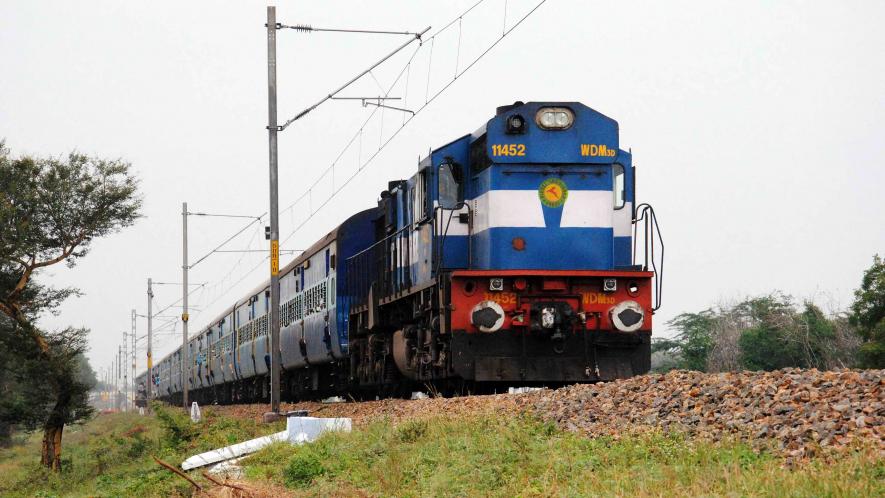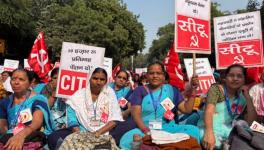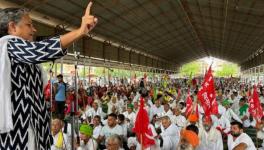Union Budget 2018-19: 'Funds For Railways Inadequate; Will Lead to More Accidents'

The Indian Railways’ capital expenditure for the year 2018-19 would be Rs. 1,46,500 crore according to the Budget presented by Finance Minister Arun Jaitley on Thursday, 1 February 2018.
Out of this, just Rs. 53,060 crore will come from budgetary support by the government. The rest are supposed to come through internal resources and Extra Budgetary Resources (EBR).
The budgetary support for the coming year is less than the Rs. 55,000 crore budgetary support provided in the budget for 2017-18. But the revised estimates for 2017-18 shows, as reported earlier, that the government cut the gross budgetary support (GBS) for the Railways mid-way through the year, by Rs. 15,000 crore, reducing the GBS to Rs. 40,000 crore.
The fund allotted as GBS in 2018-19 is lower than 2017-18 to begin with. Whether there will be further cuts, only time will tell. As mentioned in an earlier Newsclick report, the government’s hopes of raising extra budgetary resources have not materialised, and there are 2,20,000 vacancies including 1,41,000 safety categories vacancies in the Railways, most of which the government is not planning to fill. All these would have grave implications.
Newsclick spoke to R Elangovan, Vice-President of the Dakshin Railway Employees Union (DREU), affiliated to the Centre of Indian Trade Unions (CITU), on the budget provisions regarding the Indian Railways.
The reduction of budgetary support from Rs. 55,000 to Rs. 40,000 crore has already adversely affected the achievements of various physical targets set out in the previous budget, he said.
Fund cuts affect construction of lines
“Take the example of the construction of new lines, gauge conversion and doubling of railway lines. For the construction of new lines, the original target for 2017-18 was 800 km. This has now been revised to 402 km. For gauge conversion, the budgeted target was 900 km, which has now been reduced to 574 km. For doubling, the budgeted target was 1800 km, which has been revised to 945 km,” Elangovan said.
“Thus in the last budget, it was announced that 3500 km of new broad gauge line – taking the three categories I mentioned now together – would be commissioned. After revision, this has come down to 1921, a reduction of 1600 km.
Now for 2018-19, the target for new lines is 1000 km. For gauge conversion, it is 1000 km, and for doubling, 2100 km.
For new lines, budgetary support plus extra budgetary resources in 2017-18 was Rs. 22,157 crore as per the revised estimates. For 2018-19, it would be Rs. 28,484 crore. For gauge conversion, the figure was Rs. 2803 crore in 2017-18, revised estimates. For 2018-19 it would be Rs. 3876 crore. And for doubling, the figures are Rs. 16,758 crore and Rs. 17,356 crore respectively for 2017-18 and 2018-19.
Since the target for 2017-18 had been reduced by 1600 km last year, that 1600 km should be added to the 2018-19 target to complete it. Once this 1600 km backlog from last year is taken into account, it becomes clear that the target for 2018-19 is actually to lay 2600 km more lines, not 4200 km as claimed.
But in the budget speech, the Finance Minister has said, “18,000 kilometers of doubling, third and fourth line works and 5000 kilometers of gauge conversion would eliminate capacity constraints and transform almost entire network into Broad Gauge”.
This is a fraudulent statement. Actually the total length of metre gauge lines in India as on 21 March 2015 was 4908 km. In the two subsequent years 2015-16 and 2016-17, nearly 2000 km of these have been converted into broad gauge lines. So you have only 3000 km metre gauge lines left to convert. But the Finance Minister says 5000 km of metre gauge lines would be converted!
Similarly, the budgeted target for 2017-18 for doubling of lines was 1800 km. Now Mr. Jaitley is saying 18,000 km would be doubled. This is nothing but a lie.
It is said that if you lie repeatedly, the people will believe it. And the bigger the lie, the better.”
Lack of track renewals would lead to more derailments
“There is a very important aspect which is critical for safety – track renewals, the lack of which leads to derailments.
According to the White Paper on Indian Railways published in 2014 by the then Railway Minister, tracks became overdue for renewal at the rate of 4500 km a year. But the Railway is unable to renew the entire length and is renewing only 2000 to 2500 km every year, he said in the statement.
If you renew only 2000 km out of the 4500 km which become due for renewal every year, 2500 km would become arrears. As on 1 July 2014, there were 5300 km of such arrears, according to the Railway Minister’s reply in Parliament. Along with this, 4500 km had to be renewed in the subsequent four years from 2014-15 to 2017-18. Thus, a total of 18,800 km became due for renewal by 2017-18. But during 2015-16, they managed to renew only 2794 km, in 2016-17, 2487 km and in 2017-18, the target was 3600 km.
This was less than 9000 km renewed out of the total of 18,00 km, which means that another 9000 km have become overdue now. Yet in 2018-19, the target for renewal is only 3900 km.
As I said, lack of track renewals leads to derailments. In the year 2003, we had 279 derailments. There were a large number of accidents and deaths during that time. They then appointed the Justice HR Khanna Committee which recommended an investment of Rs. 17,000 crore for track renewal, renewal of bridges, signal gear renewal etc.
Out of this Rs. 17,000 crore, Rs. 12,000 crore was to come from budgetary support, and Rs. 5,000 crore through safety surcharge on passengers.
Thus Rs. 17,000 crore were invested in tracks, after which derailments slowly came down.
But after 2008 when this ended, they started reducing the budget allocation and targets for track renewal. It came down to around 2500 km per year and so on. Therefore the number of derailments started rising. From 48 in 2012-13, it rose to 52 in 2013-14, 63 in 2014-15, 65 in 2015-16, and 78 in 2016-17.
They should have taken this into consideration and the target for track renewal for the coming year should have been 4500 km plus a part of the arrears. But they are not doing that. As a result, such derailments will continue to occur in the future as well. There is total failure by the government as far as railway safety is concerned.”
What about possible train fare hikes and the moves for privatisation?
“Issues like hiking train fares and freight charges have not been mentioned in the Budget. These would be dealt with by the Railway Development Authority (RDA). In a Parliament reply on the action taken on the Debroy Committee recommendations, the government has said that decisions regarding fares and freight charges will rest with the RDA.
Regarding privatisation, the RDA will permit “fair access” to the private operators. It will be used to recommend that private parties should be allowed to run passenger and goods trains. The agenda of privatisation is very much on,” Elangovan said.
Get the latest reports & analysis with people's perspective on Protests, movements & deep analytical videos, discussions of the current affairs in your Telegram app. Subscribe to NewsClick's Telegram channel & get Real-Time updates on stories, as they get published on our website.
























